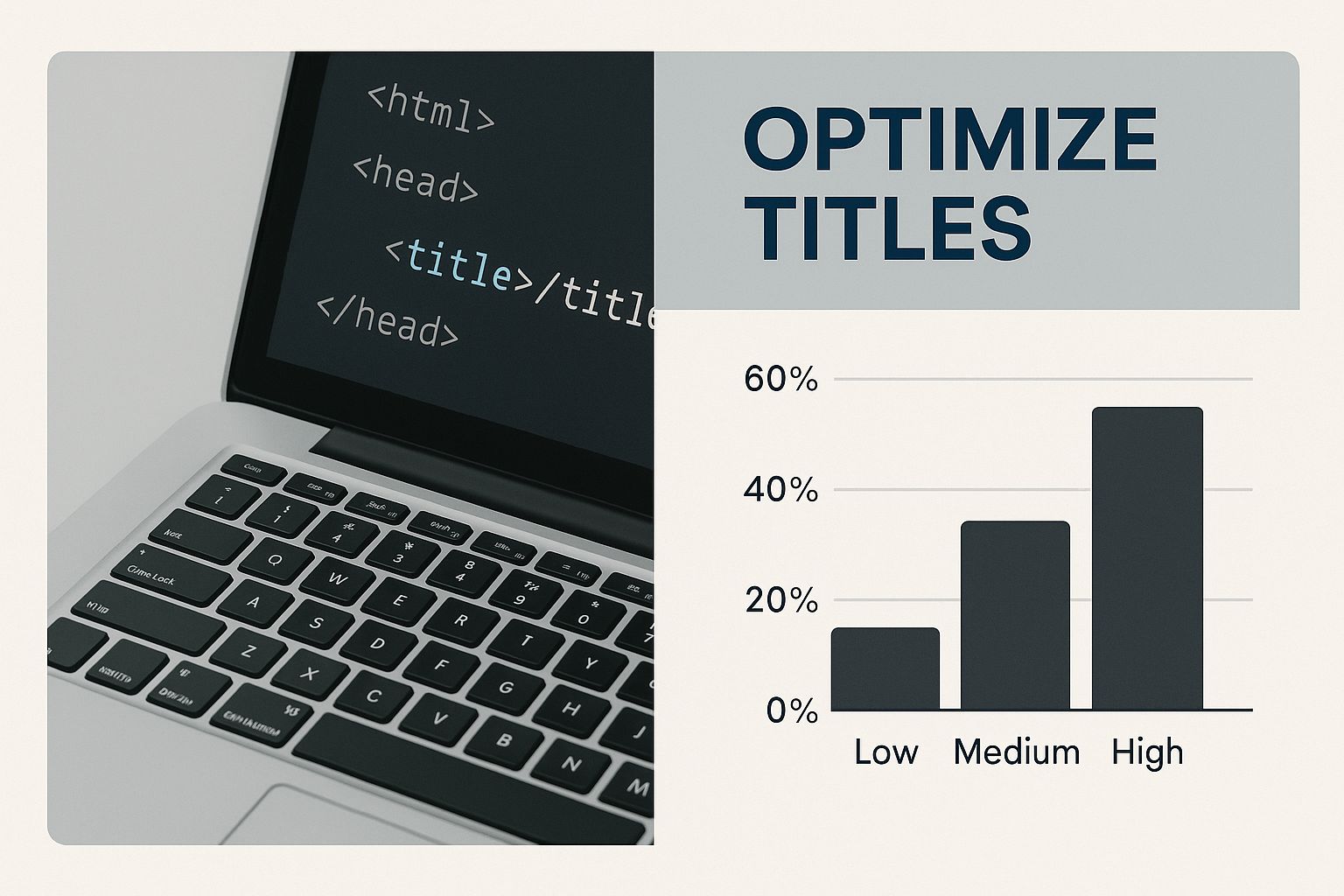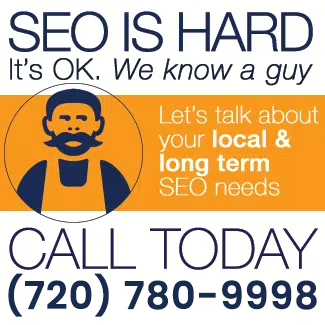Placing the right keywords on your website simply means using the words and phrases your potential customers are typing into Google. For a small business, this is how you connect with local people who are ready to hire someone. This process is about speaking their language, plain and simple.
Let The Affordable Web Guy be that expert for you. We apply these exact principles every day to help small businesses like yours grow online. Let’s have a friendly, no-nonsense chat about your website. Click and schedule a no-pressure web design consultation.
What Keywords Are and Why They Matter
Think of keywords as the connection between a customer’s problem and your business’s solution. When someone searches for “emergency plumber near me,” that phrase is a keyword. If your plumbing website uses that exact phrase, search engines like Google can connect the dots. Consequently, your business can show up in the results.

This process is not about mastering complex jargon. Instead, it is about getting inside your customers’ heads and figuring out what they are actually looking for. Getting this right means your website shows up at the exact moment a local customer needs you most.
The Power of Being Seen
The number of people searching online is staggering, with over 8.5 billion Google searches every single day. Most clicks go to the regular, organic search results, not the ads. This fact shows how important it is to get the right keywords woven into your site. When your website contains the phrases people are using, you put your business right in the middle of that activity. You can see more on these search trends and their impact.
The whole idea is simple: Make sure the words on your website match the words your customers are using to search. That’s how you get found.
A smart keyword strategy is the first step. It is how you start attracting the right kind of traffic to your website—people who are actively searching for the services you offer. This is a fundamental piece of any website meant to grow a small business. When handled correctly by a partner like The Affordable Web Guy, it becomes a powerful tool that brings in real customers.
Finding Keywords Your Customers Actually Use
Before you think about fancy tools, start with what you already know. The best keywords often come straight from the conversations you have every day. What questions do people ask on the phone? What problems are they trying to solve when they call you? Your answers contain the most valuable keywords.
Start by jotting down the specific services you offer in your local area. There is a huge difference between a vague term like “roofer” and a high-intent phrase someone actually types into Google, like “emergency roof leak repair in Springfield.” Your goal is to get a list of phrases that real people use when they need real help.
Think Like a Customer
The simplest way to get inside a customer’s head is to listen. Pay close attention to the exact words they use to describe what is wrong, as this is your keyword cheat sheet. You can also get more proactive and find great ideas on how to get customer feedback effectively to really nail down what they’re looking for.
After a few conversations, your list might look something like this:
- Local furnace repair service
- How much does a new AC unit cost
- Best landscaper for small yards
- 24-hour plumbing help near me
These are not generic guesses. They are specific, local, and signal that someone is ready to make a decision. When you build your website around these phrases, you connect directly with the people who are looking to hire you now.
Focus on Niche and Question-Based Searches
It is easy to get fixated on broad, high-traffic keywords, but that is not how most people search. Reality is much more specific. In fact, some studies show that about 95% of keywords get fewer than 10 searches per month. On top of that, 15% of all Google searches are brand new queries, and about 8% are phrased as direct questions.
This information means you need a mix of keywords, including those super-specific phrases and questions that your competitors are probably ignoring.
Focusing on highly specific, local keywords is one of the smartest moves a small business can make. You are not competing with the entire internet, just other businesses in your service area.
This whole approach is a fundamental part of building an online presence that actually works. It is one of the most practical Google ranking factors for boosting your website’s position because you are giving Google—and your customers—exactly what they are looking for. It is the same principle used at The Affordable Web Guy to build websites that get found.
Where to Add Keywords on Your Website
You have done your keyword research and you know what terms your customers are typing into Google. Now what? Knowing which keywords to use is only half the battle. The real trick is knowing where to put them on your website so they actually do some good. Think of your website like a book. You would not just scatter important words randomly through the chapters. Instead, you would put them in the title, chapter headings, and first few sentences to make the book’s topic obvious.
It is the same idea here. You need to place your keywords in the most visible, high-impact spots.
The Most Important Spots for Your Keywords
The best places for keywords are not some secret, technical black box. They are the same places real people look to figure out what a page is about. We are talking about the big, obvious stuff: the page’s main title, the subheadings that break up your text, and the actual words on the page.
Take a look at this. It shows how the page title—the one you see in the Google search results—is prime real estate for your most important keyword.

What Google sees “behind the curtain” directly affects what your potential customers see in their search results. Putting your main keyword right there in the title tells Google and the customer exactly what to expect. There is no confusion and no guessing.
To give your pages the best shot at ranking, you need to be consistent. Each location sends a signal, and when all those signals line up, your message to search engines becomes crystal clear. You are making it painfully obvious what your page offers, which is exactly what you want.
Key Places to Add Keywords on Your Website
| Website Location | Why It’s Important |
|---|---|
| Page Title | This is the headline in Google search results and the text in the browser tab. It’s the #1 most important place for your main keyword. |
| Headings & Subheadings | Think of these as chapter titles inside your page (like the heading above). Using keywords here organizes your content and reinforces the page’s structure. |
| Page URL | A clean URL with the keyword (e.g., yoursite.com/local-furnace-repair) is a powerful signal. It tells everyone what the page is about before they even click. |
| Image Alt Text | This is a simple description of an image that search engines read. It’s a perfect, natural spot to include a keyword variation or a related term. |
Placing your keywords strategically helps both search engines and human visitors quickly grasp what your page is all about.
The key is consistency, not quantity. Shoving your keyword into every sentence is a great way to sound like a robot and get ignored by Google. Placing one or two of your most important keywords in these key spots is far more effective.
This is not just theory; it is a foundational practice The Affordable Web Guy handles for every client. We build websites that are designed to be found from the ground up, making sure these core elements are working for your business from day one.
Writing Content That Actually Uses Your Keywords
You have got your list of keywords. Now what? The real work begins: weaving those phrases into your website’s pages so you sound like a human, not a robot trying to impress a search engine. The old trick of “keyword stuffing”—jamming a phrase like “best plumber in Dallas” into a page over and over again—is dead. It does not work and can get you in trouble with Google. Search engines are smart enough now to see that as spammy, low-quality content, and they will push your site down in the rankings.
Instead, your focus should always be on creating genuinely helpful information that builds trust with the person on the other side of the screen.
Focus On Being Genuinely Helpful
A much better approach is to build your content around your keywords. Think about the questions your customers are actually asking. For example, instead of just repeating “best plumber in Dallas” ten times, write a blog post titled, “How to Find the Best Plumber in Dallas.”
This simple shift does a few powerful things:
- It gets your keyword in there naturally, in a way that serves the reader.
- It immediately positions you as a helpful expert, not just a salesperson.
- It sends all the right signals to Google, showing them your website is a valuable resource.
Here’s the bottom line: Write for people first, but keep the search engines in your back pocket. When you create something valuable for a human reader, the search engine visibility almost always follows.
This is how you truly add keywords to a website in a way that gets results. You stop just listing your services and start having a real conversation with potential customers before they even pick up the phone. Finding that sweet spot between natural-sounding content and good SEO is about understanding what your audience needs and giving it to them clearly.
If you want to go deeper, we’ve got more advice on how to write website content that connects with customers. At The Affordable Web Guy, this is what we do—we craft content that works for both your audience and your business.
How AI Tools Help with Keyword Strategy
Technology, especially artificial intelligence (AI), is making the work of keyword management a whole lot easier. Your own business expertise is priceless, since nobody knows your customers and their needs like you do. However, modern tools can help turn that knowledge into a powerful keyword strategy. Think of AI as a really smart assistant. It crunches data, spots patterns, and suggests ways to improve your content, saving you time.

Making Keyword Work Smarter, Not Harder
Using AI is not about letting a robot take over your business. It is about using technology to speed up the tedious parts and find opportunities you might have missed. This is especially true when it is time to add keywords to a website. AI can analyze performance and patterns at a scale that is impossible for a human to do manually. A recent study showed that 75% of marketers now use AI to cut down on time-sucking tasks like keyword research and optimizing website tags.
The real win for a business owner is getting all the benefits of advanced tech without having to become an expert in it. This is where having a professional partner really pays off.
When you work with an expert who already uses these tools, you get the benefits of high-level local SEO services for small business baked right into your website strategy from day one.
For a deeper dive, you can read up on the core ideas behind mastering AI content optimization. At The Affordable Web Guy, we use these same advanced methods to make sure your website is built from the ground up to connect with the right customers.
Bringing in an Expert to Make It All Work
Knowing the basics of keywords is a fantastic start. But the real work of digging in, putting them into practice, tracking what works, and making constant adjustments is a full-time job. If you are busy running your business, this is where partnering with a professional is the smartest move you can make.
You have a business to run. A dedicated web partner takes all the technical SEO details off your plate. This frees you up to focus on what you do best: serving your customers and growing your company. It is not about giving up control. It is about gaining an expert ally who is 100% focused on your online growth.
Why a Partnership Just Makes Sense
Trying to manage your own keyword strategy can get overwhelming, fast. A professional already has the experience, the tools, and the time to handle everything discussed, from the initial research to building out content that keeps you relevant. They know how to weave keywords into your website in a way that feels natural and aligns with your business goals, making sure every page is pulling its weight to attract new customers.
Think of it this way: You would not try to rewire your office without an electrician. You hire someone with the right tools and knowledge. The same logic applies to building a strong online presence that gets real, measurable results.
This approach lets you get all the benefits of a solid strategy without getting tangled up in the technical weeds. Your website becomes a powerful asset that works for you around the clock, all managed by someone who knows how to make that happen.

